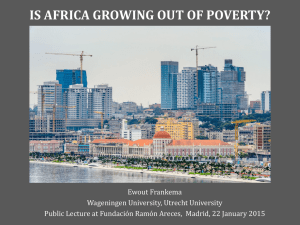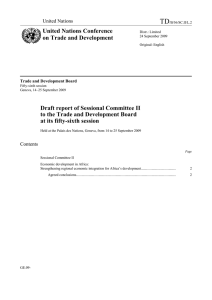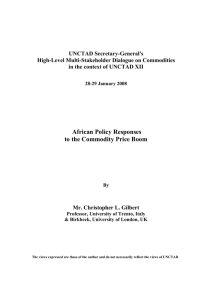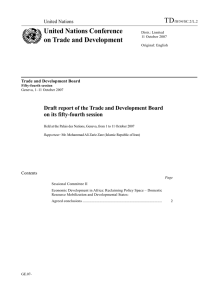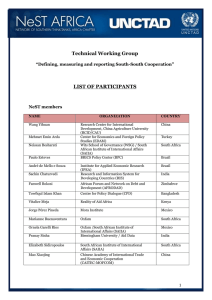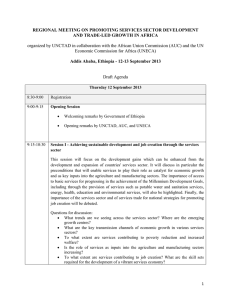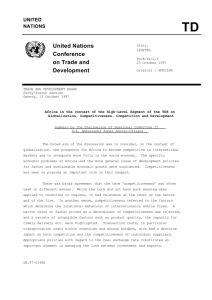REGIONAL MEETING ON PROMOTING SERVICES SECTOR DEVELOPMENT
advertisement
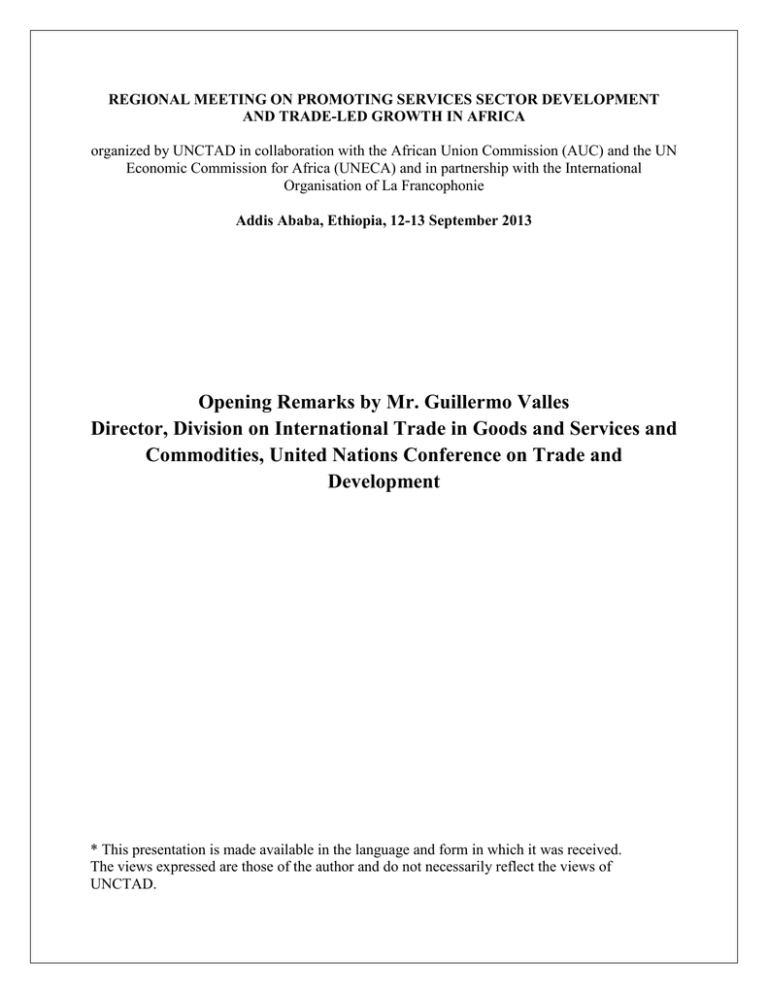
REGIONAL MEETING ON PROMOTING SERVICES SECTOR DEVELOPMENT AND TRADE-LED GROWTH IN AFRICA organized by UNCTAD in collaboration with the African Union Commission (AUC) and the UN Economic Commission for Africa (UNECA) and in partnership with the International Organisation of La Francophonie Addis Ababa, Ethiopia, 12-13 September 2013 Opening Remarks by Mr. Guillermo Valles Director, Division on International Trade in Goods and Services and Commodities, United Nations Conference on Trade and Development * This presentation is made available in the language and form in which it was received. The views expressed are those of the author and do not necessarily reflect the views of UNCTAD. 1 Regional Meeting on Promoting Services Sector Development and Trade-Led Growth in Africa Addis Ababa, Ethiopia 12-13 September 2013 Opening Speech by Mr. Guillermo Valles Director, Division on International Trade in Goods and Services and Commodities, UNCTAD Distinguished participants Ladies and Gentlemen, On behalf of UNCTAD, it is a pleasure to welcome you to this Regional Meeting on Promoting Services Sector Development and Trade-Led Growth in Africa. This meeting brings together stakeholders from different countries and regions with various development partners and donors in Africa. It is organized in collaboration with the African Union Commission (AUC), the UN Economic Commission for Africa (UNECA) and the Organisation Internationale de la Francophonie. Services and services trade play a growing role in Africa. Between 1980 and 2012, developing Africa’s exports of services increased ten-fold to nearly US$ 100 billion. This growth accelerated during the past decade, reaching an average annual rate of 10 per cent. This is an excellent performance. Yet services imports have been rising even faster, particularly since 2005. Over the past decade Africa’s trade deficit in services widened from some US$ 10 billion to US$ 76 billion. The share of services in total African exports has been falling in recent years, from a peak of 22 per cent in 1999 to 14 percent in 2012. Africa’s share of global services exports remains low, an average of 2.6 per cent over the past four decades. Ladies and gentlemen, Although the services sector and service exports have been growing in Africa, the sector remains nascent and a substantial push is needed to build productive capacity for: enhancing the quantity and quality of services output for domestic consumption and export; diversifying away from over-dependence on commodities; building a competitive economy; and generating new employment opportunities, particularly for women and youth. Services are very heterogeneous, and span a wide range of activities such as telecommunication, transport, financial services, health and education services, and professional services to name a few. They encompass both key economic activities and inputs into production as major components of the competitiveness of the economy. Services can be traded through cross-border trade, commercial presence, consumption abroad, and movement of natural persons. The development of electronic communications has opened a new avenue for exporting services through cross-border trade. Movement of natural persons has 2 particular importance for services exports of African countries and remittances are an important source of external revenues. Following the adoption of a waiver on Preferential Treatment to Services and Service Suppliers of LDCs in the 8th WTO Ministerial held in Geneva in December 2011, LDC countries requested WTO Members, to consider undertaking commitments to provide access in movement of natural persons. In addition to service liberalization under the GATS, regional integration on services is an important topic for African countries. Negotiations on free movement of services in the regional context have been completed or are underway in the regional frameworks of the ECA, COMESA and SADC. It is important for African Governments to strategically consider all the trade negotiations they are involved in so as to sequence and coordinate commitments under various trade agreements as well as unilateral policies so as to yield the highest development dividends. A major challenge will be to ensure coherence between trade and trade liberalization policies and other government policies, including policies promoting broader economic and social objectives such as pro-poor, labour market and sustainable development polices. This meeting provides an opportunity for you to share experiences with policy-making, trade negotiations and sectoral research and to discuss best-fit practices and lessons learned on how to enhance coherence, coordination and cooperation at the national and regional levels for leveraging the development benefits of services and services trade. This meeting is also an opportunity to identify elements of an African agenda relating to services policy-making and services trade negotiations. Ladies and gentlemen, Policy-makers and regulators require assistance in understanding the multiple economic, social, development and trade implications of their policies and regulations and in putting in place the adequate procedures and institutions that will allow them to successfully balance the needs and interests of all stakeholders, including government, investors, operators, civil society and consumers. UNCTAD has carried out a large body of work on services through its three pillars: research and policy analysis, intergovernmental consensus building and technical cooperation. An important part of this work comprises national Services Policy Reviews (SPRs) which aim to assist policymakers, regulators and trade negotiators better understand the multiple economic, social, development and trade implications of their policies and regulations in the services sector. For Africa four SPRs, namely Uganda I, Lesotho, Rwanda, and Uganda II have been completed. The results of these SPRs will be disseminated and discussed at this meeting. It is our sincere hope that this Meeting will bring you new knowledge, understanding, insights, and ideas, as well as an expanded network of professional contacts, that will be useful in your work and efforts to promote services sector development and trade-led growth in your countries and region. I wish you all productive meeting. Thank you.
